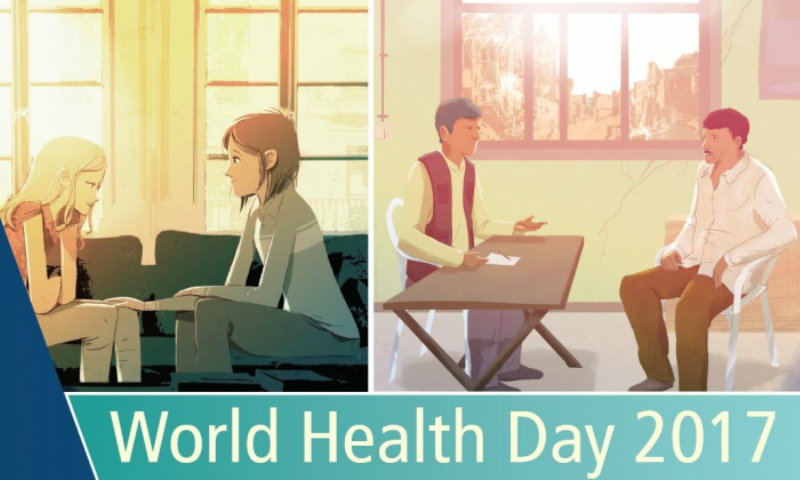
Depression affects people of all ages, from all walks of life, in all countries. It causes mental anguish and impacts on people’s ability to carry out even the simplest everyday tasks, with sometimes devastating consequences for relationships with family and friends. It also affects people’s ability to work and study. At worst, depression can lead to suicide, now the second leading cause of death among 15-29-year olds.
According to the latest estimates from WHO, more than 300 million people are now living with depression, an increase of more than 18% between 2005 and 2015. Lack of support for people with mental disorders, coupled with a fear of stigma, prevent many from accessing the treatment they need to live healthy, productive lives.
The new estimates have been released in the lead-up to World Health Day on 7 April, the high point in WHO’s year-long campaign “Depression: let’s talk”. The overall goal of the campaign is that more people with depression, everywhere in the world, both seek and get help.
Said WHO Director-General, Dr Margaret Chan: “These new figures are a wake-up call for all countries to re-think their approaches to mental health and to treat it with the urgency that it deserves.”
One of the first steps is to address issues around prejudice and discrimination. “The continuing stigma associated with mental illness was the reason why we decided to name our campaign Depression: let’s talk,” said Dr Shekhar Saxena, Director of the Department of Mental Health and Substance Abuse at WHO. “For someone living with depression, talking to a person they trust is often the first step towards treatment and recovery.”
Urgent need for increased investment
Increased investment is also needed. In many countries, there is no, or very little, support available for people with mental health disorders. Even in high-income countries, nearly 50% of people with depression do not get treatment. On average, just 3% of government health budgets is invested in mental health, varying from less than 1% in low-income countries to 5% in high-income countries.
Investment in mental health makes economic sense. Every US$ 1 invested in scaling up treatment for depression and anxiety leads to a return of US$ 4 in better health and ability to work. Treatment usually involves either a talking therapy or antidepressant medication or a combination of the two. Both approaches can be provided by non-specialist health-workers, following a short course of training, and using WHO’s mhGAP Intervention Guide. More than 90 countries, of all income levels, have introduced or scaled-up programmes that provide treatment for depression and other mental disorders using this Intervention Guide.
Associated health risks
WHO has identified strong links between depression and other noncommunicable disorders and diseases. Depression increases the risk of substance use disorders and diseases such as diabetes and heart disease; the opposite is also true, meaning that people with these other conditions have a higher risk of depression.
Depression is also an important risk factor for suicide, which claims hundreds of thousands of lives each year. Said Dr Saxena: “A better understanding of depression and how it can be treated, while essential, is just the beginning. What needs to follow is sustained scale-up of mental health services accessible to everyone, even the most remote populations in the world.”
Depression is a common mental illness characterized by persistent sadness and a loss of interest in activities that people normally enjoy, accompanied by an inability to carry out daily activities, for 14 days or longer.
In addition, people with depression normally have several of the following: a loss of energy; a change in appetite; sleeping more or less; anxiety; reduced concentration; indecisiveness; restlessness; feelings of worthlessness, guilt, or hopelessness; and thoughts of self-harm or suicide.
Source: WHO
Read our publication on youth and mental heath: http://bit.ly/youth-mentalhealth
Learn more about our work on youth, ageing and persons with disabilities.
 Welcome to the United Nations
Welcome to the United Nations